Related Research Articles

Hindi cinema, popularly known as Bollywood and formerly as Bombay cinema, refers to the film industry based in Mumbai, engaged in production of motion pictures in Hindi language. The popular term Bollywood is a portmanteau of "Bombay" and "Hollywood". The industry is a part of the larger Indian cinema, which also includes South Indian cinema and other smaller film industries.
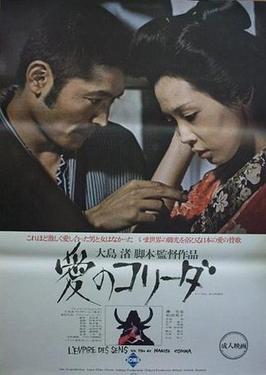
In the Realm of the Senses is a 1976 erotic art film written and directed by Nagisa Ōshima. It is a fictionalised and sexually explicit treatment of a 1936 murder committed by Sada Abe. An international coproduction of France and Japan, the film generated great controversy at the time of its release. The film had the involvement of pink film luminary Kōji Wakamatsu as co-screenwriter and assistant producer. While intended for mainstream wide release, the film contains scenes of unsimulated sexual activity between the actors.

Dimple Kapadia is an Indian actress predominantly appearing in Hindi films. Born and raised in Mumbai by wealthy parents, she aspired to become an actress from a young age and received her first opportunity through her father's efforts to launch her in the film industry. She was discovered at age 14 by the filmmaker Raj Kapoor, who cast her in the title role of his teen romance Bobby (1973), which opened to major commercial success and gained her wide public recognition. Shortly before the film's release in 1973, she married the actor Rajesh Khanna and quit acting. Kapadia returned to films in 1984, two years after her separation from Khanna. Her comeback film Saagar, which was released a year later, revived her career. Both Bobby and Saagar won her Filmfare Awards for Best Actress. Through her work over the next decade, she established herself as one of Hindi cinema's leading actresses.
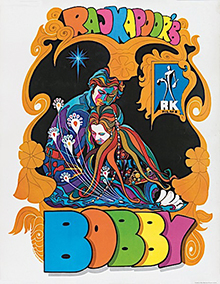
Bobby is a 1973 Indian Hindi-language musical romance film, produced and directed by Raj Kapoor, and written by Khwaja Ahmad Abbas. The film stars Raj Kapoor's son, Rishi Kapoor, in his first leading role, opposite Dimple Kapadia in her debut role. The film became a blockbuster, the top-grossing Indian hit of 1973, the second-top-grossing hit of the 1970s at the Indian box office, and one of the top 20 highest-grossing Indian films of all time. It also became an overseas blockbuster in the Soviet Union, where it drew an audience of 62.6 million viewers, making it one of the top 20 biggest box office hits of all time in the Soviet Union.

Bhanurekha Ganesan, better known by her mononymous stage name Rekha, is an Indian actress who appears predominantly in Hindi films. Acknowledged as one of the finest actresses in Indian cinema, she has starred in more than 180 films and is the recipient of several accolades, including one National Film Award and four Filmfare Awards. She has often played strong and complicated female characters—from fictional to literary—in both mainstream and independent films. Though her career has gone through certain periods of decline, Rekha has gained a reputation for reinventing herself numerous times and has been credited for her ability to sustain her status. In 2010, the Government of India honoured her with Padma Shri, India's fourth highest civilian honour.

Salaam Bombay! is a 1988 Indian Hindi-language drama film, directed, co-written and co-produced by Mira Nair. The screenwriter was Nair's creative collaborator Sooni Taraporevala. This was the first feature film directed by Nair. The film depicts the daily lives of children living in slums in Bombay, India's largest city. It stars Shafiq Syed, Raghuvir Yadav, Anita Kanwar, Nana Patekar, Hansa Vithal and Chanda Sharma.

Film censorship is carried out by various countries to differing degrees, sometimes as a result of powerful or relentless lobbying by organizations or individuals. Films that are banned in a particular country change over time.
Censorship in India has taken various forms throughout its history. Although the Constitution of India de jure guarantees freedom of expression, de facto there are various certain restrictions on content, with an official view towards "maintaining communal and religious harmony", given the history of communal tension in the nation. According to the Information Technology Rules 2011, objectionable content includes anything that "threatens the unity, integrity, defence, security or sovereignty of India, friendly relations with foreign states or public order".

The Central Board of Film Certification (CBFC) is a statutory film-certification body in the Ministry of Information and Broadcasting of the Government of India. It is tasked with "regulating the public exhibition of films under the provisions of the Cinematograph Act 1952." The Cinematograph Act 1952 outlines a strict certification process for commercial films shown in public venues. Films screened in cinemas and on television may only be publicly exhibited in India after certification by the board and edited.
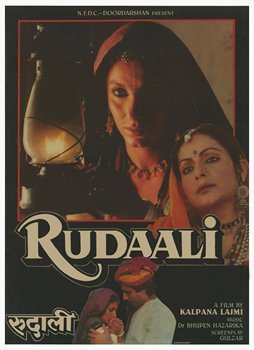
Rudaali is a 1993 Indian Hindi-language drama film directed by Kalpana Lajmi, written by Lajmi and Gulzar and based on a 1979 short story of the same name by Bengali author Mahasweta Devi. Set in a small village in Rajasthan, the film stars Dimple Kapadia as Shanichari, a lonely and hardened woman who, despite a lifetime of misfortune and abandonment, is unable to express grief through crying and is challenged with a new job as a professional mourner. Raakhee, Raj Babbar, and Amjad Khan appear in supporting roles. Produced by the National Film Development Corporation of India and Doordarshan, the film was labelled part of India's neo-realist parallel cinema, but it employed several of the common elements of mainstream Hindi cinema, including songs composed by Bhupen Hazarika.
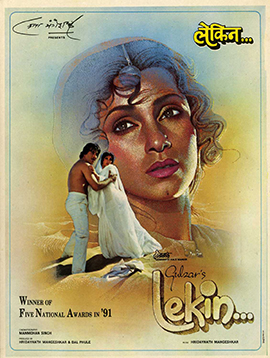
Lekin... (transl. But...) is a 1991 Hindi drama mystery film, loosely based on the 1895 short story Kshudhit Pashaan by Rabindranath Tagore and directed by Gulzar. It stars Vinod Khanna, Dimple Kapadia, Amjad Khan, Alok Nath, and Beena Banerjee, and features a special appearance by Hema Malini. The film tells the story of Reva, a restless ghost who seeks liberation and haunts the ancient palace of Raja Param Singh in Rajasthan when she is discovered by Sameer, a museum curator sent by the government to salvage valuables in the region. As she recreates a visual representation of the history of the palace which reveals her tragic story, Sameer becomes determined to help set her free.

Rekha is an Indian actress who has had a prolific career in Hindi films, and is acknowledged as one of the finest actresses of Indian cinema. She first appeared as a child artist in two Telugu-language films Inti Guttu (1958) and Rangula Ratnam (1966), but her career as a lead started with the Kannada film Operation Jackpot Nalli C.I.D 999 in 1969. In that same year, she starred in her first Hindi film, Anjana Safar, which was delayed for ten years due to censorship problems. Her first Hindi release was Sawan Bhadon (1970), a commercial success which established her as a rising star. She followed with roles in Raampur Ka Lakshman (1972), Kahani Kismat Ki (1973), and Pran Jaye Par Vachan Na Jaye (1974), to mainstream success but little recognition for her acting, and press criticism of her looks and overweight. Rekha was motivated to improve her acting and appearance and managed a well-publicised transformation, both physically and in terms of her screen persona and command of the Hindi language. Her work in the 1976 drama Do Anjaane was better received, and critical recognition of her roles as a rape victim in Ghar and a courtesan in Muqaddar Ka Sikandar (1978) marked the beginning of the most successful period of her career.
Zakhmi Aurat is a 1988 Indian Hindi drama movie starring Dimple Kapadia and Raj Babbar and directed by Avtar Bhogal. Kapadia played Kiran Dutt, a police officer who is subject to gang rape and, when the judicial system fails to convict the criminals, unites with other rape victims to castrate the rapists in revenge.

Janbaaz is a 1986 Indian action drama film, produced and directed by Feroz Khan, which became popular for its portrayal of drug addiction and Anil Kapoor and Dimple Kapadia's steamy sex scene. Sridevi appeared in a cameo appearance, capitalising on her superstardom, Khan featured her in the song "Har Kisiko Nahi Milta Yahan Pyaar Zindagi Mein" which became a chart-topping hit. The movie is greatly inspired by King Vidor's movie Duel in the Sun (1946).
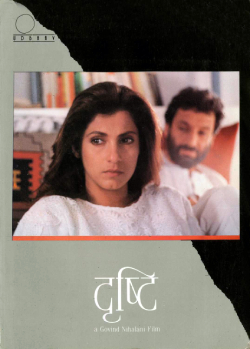
Drishti (transl. Vision) is a 1990 Indian Hindi-language drama film directed by Govind Nihalani, starring Dimple Kapadia, Shekhar Kapur and Irrfan. The film depicts the marital life of an urban couple from an upper-class milieu in Mumbai and follow their trials and tribulations, infidelity, divorce, and meeting after years of separation.

Bombay Mittayi is a Malayalam-language film directed by Umar Karikkad starring Vinu Mohan, Neelambari, Amar Singh and Sreenivasan in the lead roles. This film marks the acting debut of leading politician Amar Singh. This film also marks the entry of Bollywood actress Dimple Kapadia into Malayalam cinema. Sri Lankan actress Neelambari Perumal enters Indian Cinema through this film.
Leela is a 2002 drama film directed by Somnath Sen. The movie stars Dimple Kapadia and Deepti Naval. The film's story is loosely based on Summer of '42. The film premiered at Reel World Film Festivalm, Toronto, in 2005. It also was featured in the 2002 edition of the IAAC Film Festival, conducted by the Indian diaspora, which works to showcase the Indian films to the West.

Dimple Kapadia is an Indian actress who predominantly appears in Hindi films. She was discovered by Raj Kapoor at age 14, who gave her the title role in his teen romance Bobby (1973), opposite his son Rishi Kapoor. The film became a massive commercial success and made her an overnight star. Her role as a Christian teenager from Goa established her as a youth fashion icon and won her the Filmfare Award for Best Actress. Kapadia retired from acting following her marriage to Indian actor Rajesh Khanna earlier in 1973, and returned to the film industry in 1984, after her separation from Khanna. The release of her comeback film, Saagar, was delayed, with Zakhmi Sher becoming the second film of her career. Released in 1985, Saagar earned her a second Best Actress award at Filmfare, and she went on to establish herself as one of the leading actresses of Hindi cinema in the 1980s and early 1990s. The early roles she played following her return included the Hitchcockian thriller Aitbaar (1985), for which she received positive reviews, and the commercially successful action films Arjun (1985) and Janbaaz (1986). During this period, she acted in several films in South India, which she admitted to having made for financial gain and dismissed their quality.
References
- ↑ Rajadhyaksha, Ashish; Willemen, Paul (1999). Encyclopaedia of Indian cinema. British Film Institute. ISBN 9781579581466 . Retrieved 27 October 2012.
- ↑ Tripathi, Salil (15 August 1988). "Bombay HC ruling on screening of 'Pati Parmeshwar' sparks a debate on censorship". India Today. Living Media. Retrieved 7 June 2020.
- ↑ Mehta, Monika (2012). Censorship and Sexuality in Bombay Cinema. University of Texas Press. pp. 131–158. ISBN 978-0-292-74251-2.
- ↑ Vasudev, Aruna (March 1991). "Women beware men". Index on Censorship . 20 (3): 7–8. doi: 10.1080/03064229108535052 . ISSN 0306-4220.
- ↑ Mitter, Sara S. (1991). Dharma's Daughters: Contemporary Indian Women and Hindu Culture. Rutgers University Press. pp. 66–67. ISBN 978-0-8135-1678-3.
- ↑ Bhatia, Uday (15 June 2016). "Udta Punjab's companions in court". Livemint. Retrieved 7 June 2020.